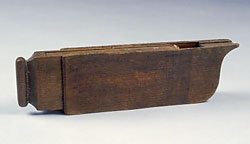Music
Chester

Since church choir members, or "singers," generally sang a capella, a pitch pipe like this one that belonged to Justin Hitchcock (1752-1822) of Deerfield, Massachusetts, helped them to find their starting note. Courtesy Pocumtuck Valley Memorial Association
The tune and text for this song were written by William Billings in 1770 and appear in his book, The New England Psalm Singer. Another (perhaps earlier) text was based on a passage from the Bible (1 Cor. 15:41) and speaks about the glory of the sun, moon and planets and how they “convey thy praise round the whole earth.” The text sung here was known unofficially as the national anthem for the American Revolution. William Billings (1746-1800) was a tanner and self-trained musician from Boston. He hobnobbed with the likes of Samuel Adams and Paul Revere. By the time of the American Revolution, he was the most popular compiler and composer of singing school books. Billings waited a year to print The New England Psalm Singer so that he could print it on colony-produced paper.
a capella voices
Lyrics
Let tyrants shake their iron rods,
And Slav’ry clank her galling chains.
We fear them not, we trust in God.
New England’s God forever reigns.
Howe and Burgoyne and Clinton, too,
With Prescott and Cornwallis joined,
Together plot our overthrow,
In one infernal league combined.
When God inspired us for the fight,
Their ranks were broke, their lines were forced,
Their ships were shattered in our sight,
Or swiftly driven from our coast.
The foe comes on with haughty stride,
Our troops advance with martial noise;
Their vet’rans flee before our youth,
And gen’rals yield to beardless boys.
What grateful off’ring shall we bring,
What shall we render to the Lord?
Loud hallelujahs let us sing,
And praise his name on ev’ry chord!
| Print | Top of Page